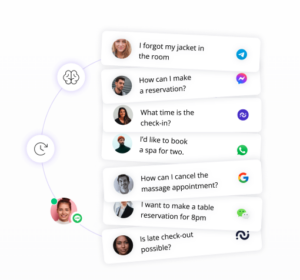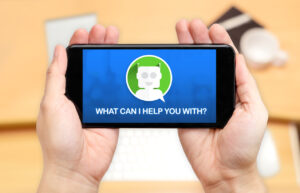Chatbots and the Hospitality Industry
Chatbots & the Customer Experience
Chatbots are either rule-based or conversational AI-powered computer programs that can help hotels improve their customer experience and reduce costs and workloads on human customer service representatives.
As digital customer service agents, they can answer questions, process reservations, and payments, personalize travel itineraries, and communicate in multiple languages, and they’re available 24/7.
Chatbots are an integral tool in the future of the hospitality industry. Their usefulness has grown beyond providing basic information to creating an advanced, fast, and seamless customer experience for your guests.
According to Meta research, seven out of 10 consumers report feeling closer to businesses they can message, and 65% of consumers prefer to contact businesses via chat.

Hotels use chatbots for:

- Responding to FAQ’s. Most customer inquiries are basic, repetitive questions that are quickly answered online, such as questions about hotel amenities, rates, and availability. Chatbots can easily be programmed to respond to these most frequently asked questions.
- Processing reservations and payments. Chatbots can integrate with a hotel’s booking system improving the efficiency of the booking process and reducing errors
- Customers using a mobile app. Chatbots make it possible for check-ins and check-outs to be transacted on a smartphone alone, with no need to visit the hotel reception desk, eliminating waiting times.
- Increasing more direct bookings. Chatbots can be an integral part of the booking journey. They offer quick and accurate answers to customers in booking mode, and help lead to more conversions.
- Upselling and cross-selling. During the booking process, the chatbot might use the information to promote additional options like room upgrades, free breakfast, or spa services.
- Providing recommendations. Chatbots can integrate with events, restaurant, and cultural attraction databases and provide recommendations and reviews
- Generating personalized travel itineraries. Chatbots can integrate with trip-planning websites to customize the visitor’s experience
- Providing customer support. Chatbots can integrate with the hotel’s customer service system and quickly address any customer needs.
- Collecting customer feedback. Chatbots can provide personalized follow-ups with your customers and gather valuable customer information helping generate customer loyalty.
While the functional benefits of chatbots are clear, the customer satisfaction value matters even more. Chatbots offer instant replies, are available 24/7, and can be programmed to communicate in multiple languages. They reduce a lot of hassle, reduce costs, and simplify the overall process.
How to transition to a chatbot strategy
- Identify areas where chatbots can contribute the most in improving the customer experience, such as real-time updates, answering frequently asked questions, and handling simple tasks like check-in and some basic concierge services.
- Train and educate employees on both the capabilities and limitations of chatbots. Provide them with tools and training to support the transition of customers to chatbots for some services.
- Create processes and policies for the use of chatbots, including defining protocols for escalating to a human representative when needed, and monitoring chatbot performance.
- Establish a dedicated team for chatbot implementation and management. Set goals and measurement strategies for chatbot performance and for coordinating with other departments on integration.
By taking these steps now hotels can leverage the power of chatbot technology to improve the customer experience in the future.

Costs for Chatbots
There are two basic types of chatbots, the more simple rule-based chatbots that access a basic database of ‘if this, then that’ type of question and the more sophisticated conversational AI chatbots that can understand and interpret communications and respond more like a live customer service agent.
The more advanced AI bots can use machine learning to adapt to customer preferences and make more personalized recommendations. While conversational AI chatbots offer a more fluid and personalized customer experience, they will cost more.
Chatbots generally charge a monthly fee, and that fee is based on the level of functionality and personalization your business wants. Prices generally range from $100 to $500 per month but can go higher for larger enterprises. The two most popular hotel chatbots are Asksuite and Quicktext, but see a link in our References to others with more detailed information and reviews.
References
Hospitality Chatbots: Everything You Need to Know in 2023
10 Reasons Why Every Hotel Needs a Chatbot
The Role of Chatbots in the Future of the Travel Industry – Forbes
10 Best Hotel Chatbots in 2023 – Hotel Tech Report
5 Ways to Measure the Effectiveness of Hotel Chatbot

